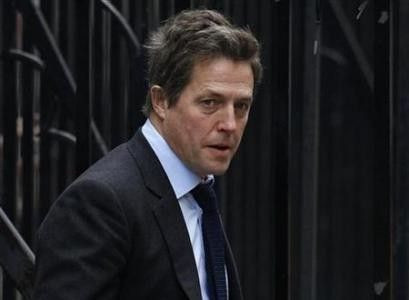Actor Coogan Says UK Tabloids Operate Like Mafia

Celebrities fear a backlash from the British tabloid press if they speak out at an inquiry into media standards, comedian and actor Steve Coogan said on Tuesday, adding that newspapers were like the Mafia in the way they operated.
A lawyer for film star Hugh Grant earlier warned that intimidatory newspaper tactics risked derailing the inquiry, ordered by Prime Minister David Cameron, after disclosures that reporters at the now defunct News of the World had hacked thousands of phones.
Coogan, best known in Britain for his portrayal of gauche TV presenter Alan Partridge, said he had lost count of the number of tabloid kiss and tell stories about him.
He denied a Daily Mail story from 2007 which alleged he took drugs with actor Owen Wilson. He said at the time of the alleged episode he had not been in the same continent as the actor for nine months.
The inquiry, which opened last week, is shining a harsh light on Britain's aggressive tabloid press, which trades on stories about the lifestyles of the rich and famous.
Coogan, wearing a sober dark suit and tie, said he felt it was necessary to speak out about the media.
Many other celebrities, for want of a better word, have told me that they agree with me and they would like to come (to the inquiry) but they don't have the stomach for it and they fear what will happen, he said.
He detailed tabloid tactics such as rooting through his rubbish bins and harassing friends and relatives for stories about him.
It's like the Mafia, it's just business, he said, echoing an attack on News Corp executive James Murdoch by a British legislator earlier this month.
Rupert Murdoch's News Corp shut down its scandal-hit News of the World, a tabloid weekly, in July.
COULSON ACCUSED
The scandal has also raised doubts about prime minister Cameron's judgment in employing former News of the World editor Andy Coulson as a media adviser until earlier this year.
Coogan described being tipped off about a sting when Coulson tried to get him to talk about an affair.
There was a girl in Andy Coulson's office who was going to speak to me on the phone -- the phone call would be recorded -- and she would try to entice me to talk about intimate details of her and my life.
I was told by (reporter) Rav Singh that Andy Coulson would be listening to the call and that I would have to be very ... if you like ... obfuscate when I had that phone call.
Lawyer David Sherborne, who is representing several victims of intrusion by Britain's scoop-hungry newspapers, hit out at the treatment of Hugh Grant after the actor told the inquiry he believed he was the victim of phone hacking.
Grant, star of Four Weddings And a Funeral, told the inquiry Monday that he believed the mid-market Mail Sunday newspaper had hacked into his phone messages.
The paper denied Grant's allegations, issuing a statement calling them mendacious smears driven by his hatred of the media.
Sherborne said the comment and coverage Tuesday in the Daily Mail, the sister paper, went beyond fair comment.
If those who have been brave enough to come and give evidence to this inquiry about what they have suffered at the hands of the press, hear that kind of plea in mitigation ... we may well face people who are unwilling to be that brave any longer.
Jonathan Caplan, representing Associated Newspapers, which includes the Mail titles, said Grant had made serious allegations that had attracted headlines around the globe.
Mr Grant is entitled to comment as he wishes, but we sought to make the point that that comment was based on the flimsiest of material, Caplan said.
His allegation that the journalists of Associated Newspapers had been involved in phone hacking was utterly refuted.
The inquiry, headed by senior judge Brian Leveson and expected to last a year, will make recommendations that are likely to have a lasting impact on the industry, leading to tighter media rules or an overhaul of the current system of self-regulation.
© Copyright Thomson Reuters 2024. All rights reserved.





















